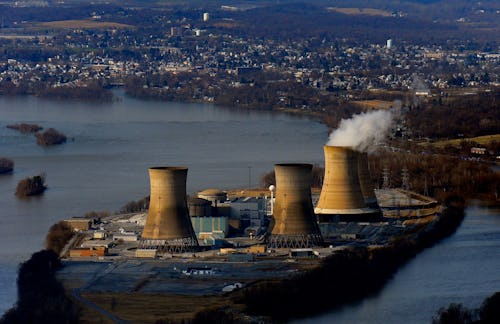Biden is pouring $6 billion into nuclear energy
Fixing our deteriorating power plants could be a key part of our climate plans.

Nuclear power doesn’t get talked about much in America, but it’s a key piece in reducing the country’s overall carbon emissions. This week, the Biden administration announced a plan to keep nuclear plants operational, a move that will go a long way toward preventing dirty-burning fossil fuels from gaining ground at a time when we can least afford it.
The new program, funded as part of the bipartisan infrastructure bill that was passed last year, will extend up to $6 billion in support to nuclear facilities that are at risk of shutting down for financial reasons. Plants that were planning to close will get a boost to keep their cores operational, while facilities that are experiencing economic hardship will get the next crack at the money. It’s effectively a bailout of an industry that has been in long need of some additional love.
Nuclear power plants quietly generate nearly 20% of electricity in the United States. During the start of the coronavirus pandemic, they grew even more important, with several plants in the U.S. setting performance records during the crisis’s early months. The energy source proved to be reliable and resilient, less challenged by the market forces that resulted in shortages at coal and natural gas plants.
Despite this, nuclear has fallen by the wayside in the U.S. Most of the country’s plants were built decades ago. Only one new plant has come online since 1996, the result of panic about the safety of the plants and concern about what to do with the nuclear waste that they produce. The result is that many plants are aging out of their certifications and in need of upgrades in order to keep running. A financial boost in the form of a bailout can help with that.
While nuclear plants certainly have their issues, the alternative to giving them some support is way worse. When these plants aren’t supported, they shut down — and fossil fuel plants typically take their place because the upstart cost of coal and natural gas is cheaper. For any faults nuclear power has, it doesn’t contribute carbon emissions.
A recent report from energy publication EE News found that when nuclear plants shut down, emissions go up. There will almost certainly be objections to the nuclear plant bailout from conservative voices who would rather allow the plants to fail than prop them up — and we could definitely do better, like building new facilities altogether or expanding renewable energy sources expeditiously to make up the difference. But saving nuclear serves as a stopgap approach until that can be done. Besides, fossil fuel companies got more than $8 billion in bailout bucks last year alone, and conservatives were cool with that.